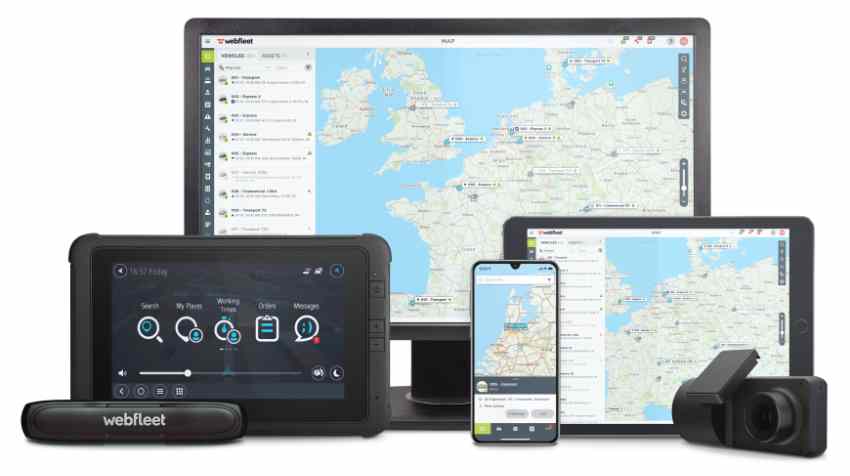During the dot-com boom, innovation was in the air. In Leipzig, Germany, two ambitious visionaries established Webfleet – one of the world’s earliest web-based fleet management solutions.
Introduced by start-up Data Factory AG, Webfleet revolutionized the industry. By allowing fleets to access cutting-edge technology without needing on-site installation, this pioneering software-as-a-service solution set a new benchmark for scalability.
Interview with Dariusz Terlecki, Regional Director Poland & EE, Webfleet
How can telematics contribute to savings in transport?
Dariusz Terlecki: Using telematics tools brings tangible benefits, including fuel savings, reductions in unplanned downtime, and cost savings linked to optimizing fleet operations and maintaining vehicles in good technical condition. There are also financial benefits from avoiding unjustified compensation claims resulting from road incidents. Webfleet customers save up to 10–15%, and in some cases even up to 20%, on fuel costs.
Telematics enables the optimization of order and operations management, saving significant time—primarily by reducing paperwork and administrative tasks. It also helps businesses stay compliant with EU regulations.
Systems such as Webfleet Video 2.0, Webfleet TPMS, and Webfleet Asset Tracking significantly simplify and streamline fleet management, reducing operational costs. Telematics also minimizes the impact of human error, and thus associated expenses. Improving smooth driving behavior, monitoring tire pressure, or providing evidence during collisions is quick and easy with Webfleet tools like Webfleet Video, OptiDrive 360, and Webfleet TPMS.

Responsible driving reduces the risk of accidents, fuel consumption, and the frequency of vehicle inspections. It can also lower insurance premiums, ultimately decreasing the total cost of vehicle ownership. For example, after implementing Webfleet OptiDrive 360, the bakery chain Putka saw average fuel consumption for its delivery vehicles drop by 1.2 liters. With a total monthly distance of 330,000 kilometers covered by their fleet, this translates into around 5,000 EUR in monthly savings.
Similarly, transport company Elmex was one of the first to implement the Fleet Care solution, enabling more effective data analysis, fault detection, and process improvement. As a result, the company reduced fuel usage by about 5% and extended tire lifespan by approximately 10%.
Webfleet Cold Chain is another example—a solution supporting the transport of goods at controlled temperatures under strictly defined conditions. These requirements apply not only to food but also to pharmaceuticals, cosmetics, and even industrial chemicals and electronics. One example is Goodspeed, a leading provider of controlled-temperature logistics services for diet catering producers in Poland, with a modern fleet of 700 vehicles. Implementing Webfleet Cold Chain enabled real-time cargo monitoring and eliminated the risk of losses due to unexpected temperature fluctuations. This strategic support helps minimize delays and product loss—critical factors in food logistics. The implementation enhanced operational efficiency and increased customer satisfaction through timely and safe deliveries.
What role do you see for artificial intelligence in the development of telematics?
D.T: In March, we launched the beta version of our AI-based Webfleet Fleet Advisor. This assistant was developed to simplify the analysis of complex data sets from vehicles and fleet management systems. Instead of navigating through extensive reports and dashboards, users can now receive the desired information instantly by entering simple text queries. Responses are generated within seconds, enabling fast reactions to key fleet management challenges.

The first module deployed is Webfleet Fleet Advisor within OptiDrive—a tool supporting the analysis of driver behavior. Users gain instant access to key indicators such as fuel consumption, carbon footprint, idling time, harsh braking, and speeding events.
The beta tests have concluded, and since April 28, Webfleet Fleet Advisor is officially available in the UK & Ireland, South Africa, Australia, and New Zealand. Starting in July, it will also be available across other EU markets, including Poland. We plan to gradually expand Webfleet Fleet Advisor’s capabilities to cover additional fleet management areas, such as reporting.
What challenges do companies offering telematics systems for commercial vehicles face today, especially regarding electric vehicles, and how are you preparing for them?
D.T: Webfleet has long been investing in and developing telematics tools tailored to transport electrification. The EV module on our platform supports both electric and mixed fleets. A major challenge in the market is the decarbonization of supply chains, including transport.
According to the report “Sustainable Development and Fleet Decarbonization. The State of the Polish Fleet Market, March 2024”, prepared by the Keralla Research Institute for Fleet magazine and Webfleet, 28% of companies have already implemented, and 18.5% are currently testing, tools to measure and report CO₂ emissions in their fleets.

A crucial part of this process is the evolution of fleets toward electric vehicles (EVs). This is an area we’ve been actively developing and supporting for a long time with solutions like Webfleet EV. We’re also investing in mobile solutions for the future, engaging the latest technologies to help fleet operators meet emerging challenges—integrating tire sensors, vehicle cameras, AI, and IoT to boost efficiency, safety, and sustainability in fleet operations now and into the future.
Webfleet is one of the world’s leading fleet management solutions, serving over 60,000 customers and drivers across 180 countries. Its subscription model makes telematics accessible to all, while the ability to personalize the system to specific needs allows for optimal support, especially for larger enterprises.
If you want to learn more about Webfleet’s solutions visit the website and request a free consultation with one of the company’s experts.


